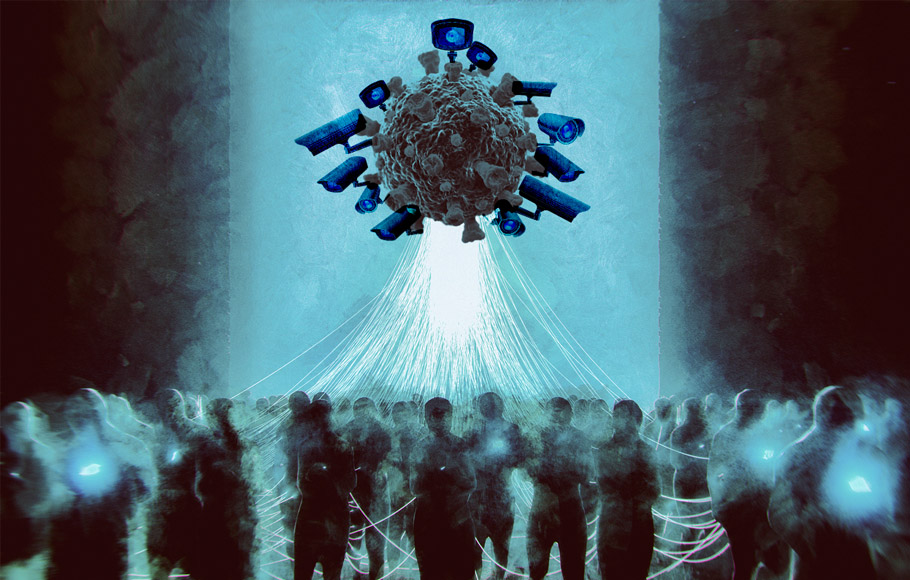
Post-coronavirus world; Dystopian surveillance or public empowerment?
One must wonder how will the post-coronavirus world look? Will the mass digital health surveillance become the new normal? Will the monitoring measures that are acceptable to people in times of emergency become permanent fixtures?

The 9/11 attacks in the United States of America changed the face of air travel. It was never the same again. Security checks became increasingly intrusive but no one complained. It was a trade-off everyone was willing to make in the interest of safety and are diligently following even now.
One must wonder how will the post-coronavirus world look? Will the mass digital health surveillance become the new normal? Will the monitoring measures that are acceptable to people in times of emergency become permanent fixtures?
There is no doubt that given a choice between privacy and health, people usually choose the latter, especially in an emergency. However, even after the COVID-19 storm subsides, the governments may continue to use the technology tools for mass surveillance.
The technology that monitors our body temperature, blood pressure, and heart-rate can also be used to keep a tab on our cultural and political preferences and our moods. This massive biometric data can become the core of a terrifying new surveillance system.
Related news: Coronavirus test results in minutes? Scientists question accuracy
The COVID-19 pandemic is already altering the rhythm of our lives; changing the way we conduct our businesses and run our economies. The post-coronavirus world may offer a myriad scenario, ranging from dystopian mass surveillance by totalitarian governments to a far more evolved and matured healthcare systems that truly empower the people.
While sceptics like Yuval Noah Harari, the author of the hugely popular Sapiens, foresee the possibility of mass surveillance technologies gaining new legitimacy in the near future, others like Vin Gupta, a professor at the University of Washington School of Medicine, predict several positive outcomes including revolutionary changes in the delivery of primary health care, tele-medicine, and greater emphasis on public spending on healthcare.
Even as prophecies about the post-pandemic world hugely vary, there are clear signs of transformative changes in several areas:
1) Power of technology: As the physical analog world is taking a hit, the digital world is thriving. In the post-pandemic world, technology will become ubiquitous and tech companies will become even more powerful and dominant.
2) Government surveillance will increase: A key fallout of the coronavirus outbreak is that the technocratic authoritarian model has proved more effective and yielded better results than the western democratic one. The contrast is clearly visible when one compares the situation in China with the ones in the US and Italy.
This will lead to further acceleration of mass surveillance by governments using new technological tools. Tracking entire populations to combat the pandemic now could open the doors to more invasive forms of government snooping later. It is certainly a worrying time for advocates of personal freedom, privacy and individual rights. Increased surveillance and health data disclosures have drastically eroded people’s ability to keep their health status private.
Related news: Spain returns ‘faulty’ COVID-19 testing kits to China
3) Hunger and job losses: The coronavirus outbreak has forced many countries to impose lockdowns, ban travel across borders and shut businesses. These unprecedented measures tore apart the social fabric of some societies and severely disrupted many economies. In the post-pandemic scenario, societies will have to grapple with mass job losses and raising the spectre of widespread hunger.
4) Growing nationalist isolation: On of the dangerous fallouts of the pandemic has been the growing xenophobia. Already, there is a growing tendency to dub the novel coronavirus as “Chinese virus”. There is a danger of populist leaders tapping into the public fears to push their nationalist agenda.
After the end of the Covid-19 crisis, some fragile States will be pushed into chaos and anarchy as the public health crisis would exacerbate the existing domestic economic crises.
5) Revolutionary changes in primary healthcare: Once the situation subsides, there will be a growing demand across the world for universal healthcare. There will be increased support for calls to elevate health security to the same priority level as other threats such as nuclear war and terrorism. Delivery of primary health care, deployment of digital technologies and use of telemedicine will see a massive rise.
6) Virtual education will have greater traction: Education is one of the most impacted areas due to coronavirus crisis. It is experiencing a rapid transition towards virtual learning. The present crisis has also offered an opportunity to reassess the education models and prioritise a culture of teaching and learning that is equitable, collaborative, ethical and accessible.
7) Changes in social values, habits: The coronavirus crisis has triggered a massive churning in the societies and changed the way they conduct their lives and interact with their families. Like how wars affect communities, it has pulled the people closer and gave them lessons on what collective action can achieve. This will result in a greater sense of community.
8) Psychological scars: The people who have mental illnesses, such as depression, obsessive-compulsive disorders and paranoia, may find it difficult to absorb the shocks. Things will also become complicated for people already struggling with abusive partners and dysfunctional families.
Amid the growing concerns over privacy, the key challenge before the nations is how to strike a fine balance between the use of technology and data for the public good while protecting citizens’ privacy. If that is not done, the consequences after the dust has settled could be big.
It must be ensured that only the data relevant to resolving the crisis should be collected and it should not be used or re-purposed for marketing, advertising or commercial purposes, or any unrelated research purposes later without informed consent. In particular, the health data must be kept confidential and secure and should be deleted automatically following the pandemic.

